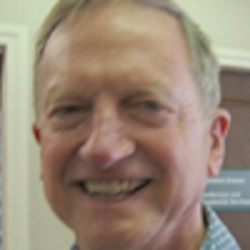
Joseph E. Illick
Ph.D., University of Pennsylvania, 1963
U.S., Colonial, History of Childhood
Appointed 1963
Emeritus, 2002.
Joseph E. Illick (1934-2023)
Joe passed away on February 23, he grew up in and near Bethlehem, Pennsylvania, which remained important to him throughout this career. He graduated from Liberty High School, in Bethlehem, in 1952.
He received his BS in Engineering from Princeton University in 1956, then changed his career objectives and entered the history graduate program at the University of Pennsylvania, receiving his MA in 1958 and PhD in 1963.
He came to our department in 1963 as our specialist in colonial America. Bill Issel, who had recently transferred from UC Berkeley to San Francisco State in order to study with John Shover (Berkeley then had no labor historians on the faculty) took Joe’s colonial history course, which he recalls as one of the most engaging classes he attended at Berkeley, University of Pittsburgh, and University of Pennsylvania.
Joe's dissertation was published as William Penn, the Politician (Cornell University Press, 1965). He edited an anthology, America & England, 1558-1766 (Appleton-Century) that appeared in 1970. His Colonial Pennsylvania: A History was published by Scribner in 1976. His articles on William Penn, colonial Pennsylvania, and related topics appeared in the William and Mary Quarterly, Western Historical Quarterly, Pennsylvania History, and other journals.
Joe also taught our course on American biography, a course originally created to help prepare elementary and secondary teachers, but Joe expanded the course to allow students to explore the then emerging fields of psychohistory and the history of childhood. He attended classes at the San Francisco Psychoanalytic Institute, and brought together his colonial American interests with psychohistory in his article, "John Quincy Adams: The Maternal Influence," in the Journal of Psychohistory in 1976. He also and developed one of the first courses on the history of childhood and published on that topic in the History of Education Quarterly and History of Childhood. His book, At Liberty: The Story of a Community and a Generation, the Bethlehem, Pennsylvania, High School Class of 1952 (1989) was inspired both by his interest in psychohistory and the history of childhood as well as his own high school reunion; that book reached a national readership beyond specialists in United States history. Joe continued to be called on as a specialist in colonial American history. The editors of one of the leading journals on Pennsylvania history asked him to write a state-of-the-field essay in the late 1990s: "Childhood in Three Cultures in Early America," Pennsylvania History (1997).
Joe became emeritus in 2002, the same year that his American Childhoods appeared; that book was praised as "synthesizing an enormous amount of secondary source material . . . a stunning achievement." Joe then turned to another project on the history of American childhood that he had planned for many years. Believing that students in history classes should have a chance to write history from original sources just as professional historians did, he had assigned his students to write histories of their own families. He collected those histories for some twenty years, stored them in the San Francisco State University library. Now, in retirement, Joe was ready to turn them into what would have been a fascinating book. But when he went to the SF State library to retrieve his documents, he found that they had been lost when the library moved to its new building. Joe was bereft.
Still, he continued publishing. His essay, "Going Back to High School," appeared in American Studies in 2004, and he contributed an essay to The Global History of Childhood Reader (2012). His last publication was a book review in the New England Quarterly in 2018.
In retirement, Joe pursued an interest in art, especially block printing. He combined this interest with history in a self-published book of his prints of all the president and his own poetry about them: American Presidents in Portraits and Verse. A few examples of his verse:
Thomas Jefferson, a liberal intellectual
Believed in freedom, political and sexual.
Woodrow Wilson, flexible and rigid,
Could be warm, could be frigid.
Raised on Presbyterian principle,
Sometimes thought himself invincible.
From the silver screen of Hollywood
Ronnie rode tall for the nation's good.
The task was simple, his saying went:
"We must be rid of big government."
In retirement, Joe also became a passionate member of the Dolphin Club and frequently swam in the bay. He made many new connections in the process, and these relationships opened new vistas for him. Joe was on coming out of the bay from a swim when he fell and suffered a serious brain injury that led to his death.
Joe's colleagues remember his as always friendly and supportive. He was a kind, convivial, and warm individual who enjoyed hosting parties, engaging friends, and traveling. He was a proud father and grandfather and will be missed for his warmth and wit, and the breadth and depth of his intellectual capacities.